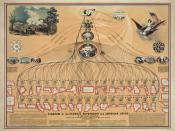Introduction
Globalization has become one of the biggest issues in the economic world today and because of the impact, many things have changed - including how countries operate with each other. Thus, international trade has evolved into a complex system of trade barriers to ensure the protection of domestic industry and its workers interests. The trade impediments and subsidies include protective tariffs, import quotas, non-tariff barriers i.e. licensing, and export subsidies. In addition the international laws created by the WTO, the US government also employs the use of protective tariffs and export subsidies to protect and aid its domestic industry. These duties are designed to shield the domestic industry from foreign competition - one of the most publicized tariffs the US government uses in the Antidumping (AD) duty, which is similar to the WTO Antidumping Agreement. Dumping is the selling of a product on a foreign market at a price "less than fair value".
This practice can cause material injury to the domestic industry producing a similar product. To reverse this problem, AD is taxed on specific imports to raise their price.
Although this is not a new practice, it was the first time Kanzen Berhad (KB), a stainless steel subsidiary of Kanzen Tetsu Sdn. Bhd (KTSB), was faced with an antidumping action filed by the US industry. Mr. Eu Hong Chew, Senior Manager and Director of KB, had previous warnings that AD could quickly become a problem; however, he did not expect the US to act as swiftly as they did. The issues facing KB were: "How could KTSB win the case? In the event that antidumping duties were imposed on imports from Malaysia, what should KTSB do?" These questions also lead to other pressing issues such as how is antidumping really calculated and is it a fair practice?...


